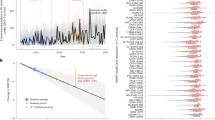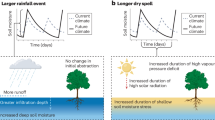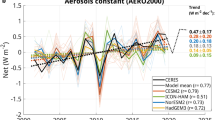Abstract
The possibility that future climate change may affect agriculture has attracted considerable attention1,2. As a step towards evaluating such influences, the effect of climate trends over the past few decades3 needs to be assessed. Here I estimate the contribution of climate trends in Australia4,5 to the substantial increase in Australian wheat yields since 1952. Non-climatic influences— such as new cultivars and changes in crop management practices—are removed by detrending the wheat yield and climate variables and using the residuals to calculate quantitative relationships between variations in climate and yield. Climate trends appear to be responsible for 30–50% of the observed increase in wheat yields, with increases in minimum temperatures being the dominant influence. This approach should be applicable in other regions for which sufficient data exist.
This is a preview of subscription content, access via your institution
Access options
Subscribe to this journal
Receive 51 print issues and online access
$199.00 per year
only $3.90 per issue
Buy this article
- Purchase on Springer Link
- Instant access to full article PDF
Prices may be subject to local taxes which are calculated during checkout
Similar content being viewed by others
References
Parry, M. Climate Change and World Agriculture (Earthscan, London, 1990).
Reilly, J. et al. in Climate Change 1995. Impacts, Adaptations and Mitigation of Climate Change: Scientific-technical Analyses (eds Watson, R. T. et al.) 427–467 (Cambridge Univ. Press, New York, 1996).
Nicholls, N. et al. in Climate Change 1995: The Science of Climate Change (eds Houghton, J. T. et al.) 133–192 (Cambridge Univ. Press, 1996).
Torok, S. J. & Nicholls, N. A historical annual temperature dataset for Australia. Aust. Meteorol. Mag. 45, 251–260 (1996).
Lavery, B., Joung, G. & Nicholls, N. An extended high quality historical rainfall data set for Australia. Aust. Meteorol. Mag. 46, 27–38 (1997).
Stone, R., Nicholls, N. & Hammer, G. Frost in northeast Australia: Trends and influences of phases of the Southern Oscillation. J. Clim. 9, 1896–1909 (1996).
Woodruff, D. R. WHEATMAN: A decision support system for wheat crop management in subtropical Australia. Aust. J. Agric. Res. 43, 1–11 (1992).
Hobbs, J., Anderson, J. R., Dillon, J. J. & Harris, H. in The Impact of Climate Variations on Agriculture (eds Parry, M. L., Carter, T. R. & Konjin, N. T.) 667–757 (Kluwer, Dordrecht, 1988).
Keeling, C. D. & Whorf, T. P. in Trends '93: A Compendium of Data on Climate Change (eds Boden, T. A., Kaiser, D. P., Sepanski, R. J. & Stoss, F. W.) (Carbon Dioxide Information Analysis Center, Oak Ridge National Laboratory, Oak Ridge, TN, 1994).
Parry, M. & Carter, T. Climate Impact and Adaptation Assessment. The IPCC Model (Earthscan, London, 1996).
Author information
Authors and Affiliations
Rights and permissions
About this article
Cite this article
Nicholls, N. Increased Australian wheat yield due to recent climate trends. Nature 387, 484–485 (1997). https://doi.org/10.1038/387484a0
Received:
Accepted:
Issue Date:
DOI: https://doi.org/10.1038/387484a0
This article is cited by
-
Analysis of climatic trends in climate divisions of Oklahoma, USA
Theoretical and Applied Climatology (2023)
-
Impacts of climate change and extreme weather on food supply chains cascade across sectors and regions in Australia
Nature Food (2022)
-
Evidence of sweet corn yield losses from rising temperatures
Scientific Reports (2022)
-
Increasing dominance of Indian Ocean variability impacts Australian wheat yields
Nature Food (2022)
-
Contributions of climate change to cereal yields in Tibet, 1993–2017
Journal of Geographical Sciences (2022)
Comments
By submitting a comment you agree to abide by our Terms and Community Guidelines. If you find something abusive or that does not comply with our terms or guidelines please flag it as inappropriate.



